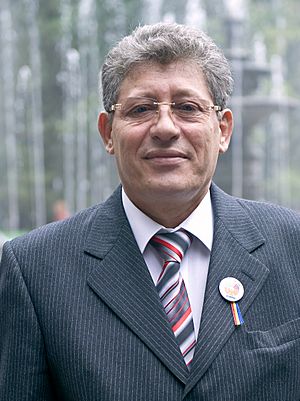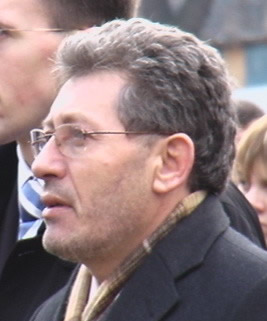Mihai Ghimpu facts for kids
Quick facts for kids
Mihai Ghimpu
OR
|
|
|---|---|

Ghimpu in 2009
|
|
| Acting President of Moldova | |
| In office 11 September 2009 – 28 December 2010 |
|
| Prime Minister | Zinaida Greceanîi Vitalie Pîrlog (acting) Vlad Filat |
| Preceded by | Vladimir Voronin |
| Succeeded by | Vlad Filat (acting) |
| President of the Moldovan Parliament | |
| In office 28 August 2009 – 28 December 2010 |
|
| President | Vladimir Voronin Himself (acting) |
| Prime Minister | Zinaida Greceanîi Vitalie Pîrlog (acting) Vlad Filat |
| Deputy |
See list
Serafim Urechean
Iurie Țap Marcel Răducan Alexandr Stoianoglo |
| Preceded by | Vladimir Voronin |
| Succeeded by | Marian Lupu |
| Member of the Moldovan Parliament | |
| In office 22 April 2009 – 9 March 2019 |
|
| Parliamentary group | Liberal Party |
| In office 3 September 1990 – 9 April 1998 |
|
| Parliamentary group | Popular Front |
| Constituency | Chișinău |
| President of the Liberal Party | |
| In office 5 January 1998 – 1 December 2018 |
|
| Preceded by | Anatol Șalaru (as Leader of the Reform Party) |
| Succeeded by | Dorin Chirtoacă |
| Member of the Chișinău Municipal Council | |
| In office 22 June 2007 – 5 April 2009 |
|
| President of the Chișinău Municipal Council | |
| In office 11 November 2007 – 6 June 2008 |
|
| Succeeded by | Eduard Mușuc |
| Personal details | |
| Born | 19 November 1951 Colonița, Moldavian SSR, Soviet Union |
| Citizenship | |
| Political party | Popular Front (1990–1993) Liberal Party (1993–present) |
| Other political affiliations |
Bloc of the Intellectuals (1994) Alliance for European Integration (2009–present) |
| Spouse | Dina Ghimpu |
| Relatives | Gheorghe Ghimpu (brother) Dorin Chirtoacă (nephew) Simion Ghimpu (brother) |
| Alma mater | Moldova State University |
| Awards | Order of the Star of Romania, 1st Class |
Mihai Ghimpu (born 19 November 1951) is a Moldovan politician. He was the Speaker of the Moldovan Parliament, which is like the leader of the country's main law-making group. He also served as the Acting President of Moldova from 2009 to 2010. Ghimpu was a member of the Moldovan Parliament for many years, from 1990 to 1998 and again from 2009 to 2019. He was also the leader of the Liberal Party (PL) from 1998 to 2018.
Contents
Mihai Ghimpu's Family Life
Mihai Ghimpu was born on 19 November 1951 in a village called Colonița, which is near Chișinău in what was then the Moldavian SSR. His mother, Irina Ursu, worked on a local collective farm, known as a kolkhoz. His father, Toader Ghimpu, was an elementary school teacher for a few years before also working on the collective farm. Mihai is the youngest of his siblings. He has two brothers, Gheorghe Ghimpu and Simion Ghimpu, and a sister, Valentina. Valentina is the mother of Dorin Chirtoacă, who is Mihai Ghimpu's nephew. Mihai Ghimpu has been married to Dina Ghimpu for over 30 years, and she works for Moldova's Culture Ministry. They do not have children.
Education and Early Career
Mihai Ghimpu went to elementary school in his hometown. After that, he attended a high school in Chișinău. He then completed his compulsory military service in the Soviet army until 1972. From 1974 to 1978, Ghimpu studied law at Moldova State University. After finishing his studies, he worked as a legal advisor for different state companies. From 1978 to 1990, he continued working as a lawyer, led legal departments, and even served as a judge in a part of Chișinău.
In the late 1980s, Mihai Ghimpu became involved in the democratic movement in Moldova. He helped start the Popular Front of Moldova, which was a very important political group in the country. In the 1990 elections, he was chosen to be a member of the Moldovan Parliament as a representative of the Popular Front. In 1991, he voted for the Declaration of Independence of Moldova, which made Moldova an independent country.
In 1997, Mihai Ghimpu became the chairman of the Party of Reform. This party later changed its name in April 2005 to the Liberal Party of Moldova (PL). In 2007, Ghimpu was elected as an alderman (a local council member) in the Chișinău City Council. A couple of weeks later, his nephew, Dorin Chirtoacă, who was the vice-president of the Liberal Party, became the mayor of Chișinău. In the April 2009 elections, the Liberal Party won 15 out of 101 seats in Parliament, and Ghimpu became a Member of Parliament again. He was re-elected in the July 2009 elections.
Key Moments in Mihai Ghimpu's Career
Here are some important moments in Mihai Ghimpu's career:
- 1988–1993: He helped start the democratic movement called the Popular Front of Moldova.
- 1990–1998: He was a member of the Parliament of the Republic of Moldova and served as the Vice Chairman of the Legal Committee.
- 1998–2018: He was the Chairman of the Liberal Party (PL).
- 2007–2009: He served as an alderman in the Chișinău City Council.
- 2007–2008: He was the Chairman of the Chișinău City Council.
- 28 August 2009: He was elected as the Speaker of the Moldovan Parliament.
- 11 September 2009 – 28 December 2010: He served as the interim, or temporary, President of the Republic of Moldova.
Forming the Alliance For European Integration
In July 2009, new parliamentary elections were held in Moldova. The Moldovan Communist Party won the most votes, but four other parties also entered Parliament: the Liberal Democratic Party of Moldova, the Liberal Party, the Democratic Party of Moldova, and the Party Alliance Our Moldova.
The leaders of these four parties, including Mihai Ghimpu from the Liberal Party, worked together for over a week to form a new government. In August 2009, they created a ruling group called the "Alliance For European Integration." This alliance aimed to bring Moldova closer to Europe.
Serving as President of the Moldovan Parliament
On 28 August 2009, Mihai Ghimpu was chosen to be the Speaker of the Moldovan Parliament. This was done through a secret vote, and he received all 53 votes from the parties in the Alliance For European Integration.
After being elected, Mihai Ghimpu said, "I thank my colleagues for their trust. I hope that while in this post I will cooperate for a free press, independent legal system, and a state of law of which all the Moldovan citizens will be proud." This means he wanted to work for a country where the news is free, the laws are fair, and everyone is proud to be a citizen.
In July 2010, while speaking at a big meeting of Parliament Speakers in Geneva, Ghimpu talked about why Moldova was one of the poorest countries in Europe. He mentioned that it was partly because democratic changes were not made at the right time. He also pointed out that a foreign army and its equipment were still present in Moldova.
Serving as Acting President of Moldova
On 11 September 2009, Mihai Ghimpu became the acting president of Moldova. This happened because the previous president, Vladimir Voronin, resigned. According to Moldova's Constitution, when the president's position becomes empty, the Speaker of Parliament takes over as acting president. So, Mihai Ghimpu became the temporary president until a new one could be elected by the Parliament.
In December 2009, a special group called the Commission for constitutional reform in Moldova was created to help solve a problem with the country's constitution. In January 2010, Ghimpu also set up a group to study the history of the Soviet rule in Moldova.
In June 2010, Ghimpu issued a special order to mark a "Soviet Occupation Day." However, this order was later canceled by the Constitutional Court in July 2010. He also helped to unveil a special stone to remember the victims of totalitarian rule.
Mihai Ghimpu has received an important award called the Order of the Star of Romania, 1st Class.
Views on Identity
Mihai Ghimpu strongly believes that the people of Moldova and Romania share the same ethnic identity and language. He has said that the language spoken in Moldova is Romanian and that Moldovans are Romanians. He believes it is important to tell people the truth about their identity.
See also
 In Spanish: Mihai Ghimpu para niños
In Spanish: Mihai Ghimpu para niños
- Liberal Party (Moldova)
- Liberalism
- Parliament of the Republic of Moldova
- President of Moldova
- Acting President of Moldova
 | Sharif Bey |
 | Hale Woodruff |
 | Richmond Barthé |
 | Purvis Young |


